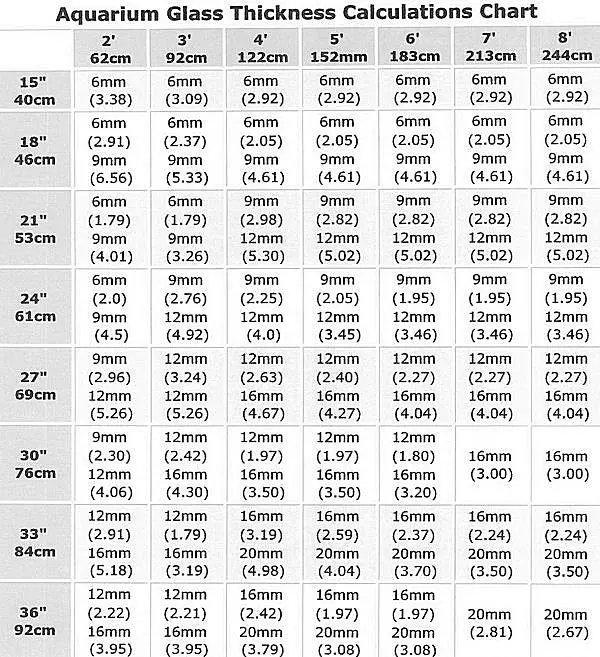Originally posted on May 10, 2023 @ 6:00 am
Last Updated on 7 months by admin
Aquariums are a popular addition to homes and offices, bringing a slice of marine life into our everyday environment. But have you ever wondered how thick the glass in an aquarium actually is? The thickness of aquarium glass is a crucial factor in determining the safety and durability of the tank, and it can vary depending on a number of different factors.
The thickness of aquarium glass can depend on the size of the tank, the type of glass used, and the pressure exerted by the water. It’s important to choose a tank with the appropriate thickness to ensure that it can withstand the weight of the water and any other decorations or equipment inside. So, let’s dive in and explore the world of aquarium glass thickness!
Aquarium glass thickness varies depending on the size and type of aquarium. Generally, the standard glass thickness for a small to medium-sized aquarium is around 1/4 inch (6mm). However, larger aquariums may require thicker glass, up to 3/4 inch (19mm) for extremely large tanks. It’s important to consult with a professional to determine the appropriate glass thickness for your aquarium.

How Thick is Aquarium Glass?
Aquariums are an amazing way to bring the beauty of the underwater world into your home or office. But have you ever wondered how thick the glass on an aquarium should be? The answer is not as straightforward as you might think. In this article, we will explore the factors that determine the thickness of aquarium glass and how to choose the right thickness for your aquarium.
Factors that Determine Aquarium Glass Thickness
The thickness of aquarium glass depends on several factors, including the size of the aquarium, the type of glass used, and the water pressure.
Size of the Aquarium
The size of the aquarium is one of the most important factors to consider when determining the thickness of the glass. Generally, the larger the aquarium, the thicker the glass needs to be. This is because larger aquariums hold more water, which creates more pressure on the glass.
Type of Glass Used
The type of glass used also plays a role in determining the thickness of the aquarium. There are several types of glass available, including tempered glass, annealed glass, and laminated glass. Tempered glass is the strongest and most durable, making it ideal for larger aquariums. Annealed glass is less expensive but not as strong as tempered glass. Laminated glass consists of multiple layers of glass with a plastic interlayer, making it even stronger than tempered glass.
Water Pressure
The depth of the aquarium and the amount of water it holds also affect the water pressure on the glass. The deeper the aquarium, the more pressure on the glass. Additionally, the weight of the water and any decorations or equipment inside the aquarium can also increase the water pressure.
Choosing the Right Thickness of Aquarium Glass
Now that we know the factors that determine the thickness of aquarium glass, let’s talk about how to choose the right thickness for your aquarium.
Small Aquariums
For aquariums that are less than 30 gallons, the glass should be at least 1/4 inch thick.
Medium Aquariums
For aquariums that are between 30 and 70 gallons, the glass should be at least 3/8 inch thick.
Large Aquariums
For aquariums that are larger than 70 gallons, the glass should be at least 1/2 inch thick.
It’s also important to consider the type of glass used. As mentioned earlier, tempered glass is the strongest and most durable. If you have a large aquarium, it’s recommended to use tempered glass for added safety and peace of mind.
Benefits of Choosing the Right Thickness of Aquarium Glass
Choosing the right thickness of aquarium glass is crucial for the safety and well-being of your aquatic pets. If the glass is too thin, it can crack or break under the pressure of the water, causing harm to your fish and other marine life. Thick glass provides a strong and stable environment for your aquatic pets to thrive in.
Aquarium Glass Thickness vs. Acrylic Thickness
Acrylic is an alternative to glass for aquariums, and it has become increasingly popular in recent years. Acrylic has many advantages, including being lighter and more durable than glass. However, it also has some disadvantages, including being more expensive and more prone to scratches and discoloration.
When it comes to thickness, acrylic is generally stronger than glass. For example, a 1/4 inch thick acrylic panel can withstand the same pressure as a 1/2 inch thick glass panel. However, acrylic is more flexible than glass, which can cause it to bow or warp over time.
Conclusion
In conclusion, the thickness of aquarium glass depends on several factors, including the size of the aquarium, the type of glass used, and the water pressure. Choosing the right thickness of aquarium glass is crucial for the safety and well-being of your aquatic pets. Remember to consider the size of your aquarium and the type of glass used when determining the appropriate thickness.
Frequently Asked Questions
In this section, we’ve compiled a list of common questions people have about the thickness of aquarium glass. Read on to learn more about this topic.
What is the standard thickness of aquarium glass?
The thickness of aquarium glass depends on the size of the tank. In general, the larger the tank, the thicker the glass. For small tanks, the glass may be as thin as 3 mm. Medium-sized tanks typically have glass that is 5-6 mm thick. Large tanks that hold 100 gallons or more may have glass that is up to 19 mm thick. Keep in mind that these are just general guidelines, and the exact thickness of the glass can vary between manufacturers.
It’s also worth noting that the type of glass used can affect the thickness. For example, tempered glass is stronger than regular glass, so it can be thinner while still maintaining the same level of strength. However, tempered glass is more expensive, so it may not be used in all aquariums.
Can you use thinner glass for smaller aquariums?
Yes, smaller aquariums can have thinner glass than larger ones. However, it’s important to make sure that the glass is still strong enough to support the weight of the water and any decorations or equipment in the tank. To determine the appropriate thickness for your aquarium, you can use online calculators or consult with an aquarium professional.
Keep in mind that thinner glass is more prone to breaking or cracking, so it’s important to handle the tank carefully and avoid any sudden impacts or movements.
What factors can affect the thickness of aquarium glass?
Several factors can influence the thickness of aquarium glass, including the size and shape of the tank, the type of water being used (saltwater is heavier than freshwater), and the weight of any decorations or equipment in the tank. The height of the tank can also be a factor, as taller tanks may require thicker glass to prevent bowing or cracking.
It’s important to choose the appropriate thickness of glass for your tank to ensure its safety and longevity. Consulting with an aquarium professional or doing research online can help you make an informed decision.
Is thicker aquarium glass always better?
While thicker glass may seem like the safest option, it’s not always necessary or practical. Thicker glass is heavier and more expensive, which can make it more difficult to handle and transport. Additionally, very thick glass can distort the view of the tank, making it harder to see the fish and decorations inside.
Choosing the appropriate thickness of aquarium glass depends on several factors, including the size and shape of the tank, the type of water being used, and the weight of any decorations or equipment. Consulting with an aquarium professional or doing research online can help you determine the best thickness for your specific situation.
Can aquarium glass be repaired if it cracks or breaks?
If your aquarium glass cracks or breaks, it’s important to replace it as soon as possible to avoid any leaks or damage to the tank’s inhabitants. In some cases, it may be possible to repair small cracks or chips with a glass repair kit. However, larger cracks or breaks will typically require the entire panel of glass to be replaced.
If you’re unsure how to replace the glass or don’t feel comfortable doing it yourself, it’s best to consult with an aquarium professional. They can help you choose the appropriate glass and install it safely and correctly.

Best glass mm for your fish tank | Aquarium glass thickness calculator
In conclusion, the thickness of aquarium glass is crucial for the safety and well-being of your aquatic pets. It’s essential to understand that thicker glass provides better insulation, which helps maintain a stable temperature inside the aquarium. Moreover, thicker glass can withstand more pressure and is less likely to crack or shatter, reducing the risk of a disastrous aquarium leak.
When choosing the thickness of your aquarium glass, it’s important to consider the size of your aquarium and the type of aquatic life you want to keep. For smaller tanks, like those under 20 gallons, 1/4 inch thick glass is sufficient. However, for larger tanks, 3/8 inch or even 1/2 inch thick glass is recommended.
Overall, investing in high-quality, thick glass for your aquarium can save you a lot of trouble in the long run. Not only does it provide a safer environment for your aquatic pets, but it also offers peace of mind for you as a responsible aquarium owner.
